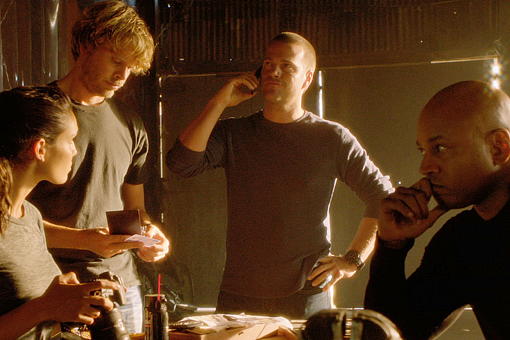By Becky Kifer · September 22, 2011

There is one thing the NCIS franchise is not, and that is cool. The two-show CBS punch may garner the kind of ratings that the producers of Emmy-laden programs like Mad Men or 30 Rock would probably shank a man to get, but NCIS: Los Angeles and its parent show NCIS both remain pop-culture pariahs.
They may not be trendy, but that doesn’t keep them from being eminently watchable. Your friends may not be aware of this, but just ask your grandparents—they know what I’m talking about. For all of its formulaic kooks, I’m not ashamed to admit my fondness for the original NCIS; it’s been a regular on my TiVo for years. But NCIS: LA—or as they call it here in Los Angeles, NCIS: Wait, What’s NCIS Again?—mostly helps me kill time between loads of laundry.
I’ve always been put off by NCIS: LA’s overly processed vibe. Instead of embracing the comfort food aura that NCIS has perfected in its nine-year tenure, NCIS: LA has never ceased its quest to prove itself hip in the face of what it is. With its hybrid mix of real and fictionalized tech (you know their operations room is fancy because it has a sliding door) and an opening theme song that practically kicks you in the face with enthusiasm, NCIS: LA is undeniably slick. But slickness as a replacement for soul cannot work long-term.
Judging by the season three premiere, it doesn’t appear like too much has changed. But I do sense a whiff of transformation in the air.
Season three opens with the team—NCIS agents Callen (Chris O’Donnell), Hanna (LL Cool J) and Blye (Daniela Rush), along with LAPD liaison Deeks (Eric Christian Olsen)—attempting to track down their tiny wayward leader, Hetty (Linda Hunt), who resigned last season before taking off for Romania on a secret mission. Now in sepia-toned Romania (because all non-US counties have to be sepia-toned), the agents stand on a beach as enigmatic Callen—group leader and general sour puss—realizes that this is the same beach where his mother was murdered in front of him as a child. (Why his mother came back to a country where people wanted to kill her entire family is never really addressed.)
The mystery evolves from there as the agents race to find Hetty, who’s risked her life to meet with the Comescu family, a dangerous clan with a blood vendetta against Callen (for reasons even he doesn’t know, but will soon find out… if Hetty lives to tell the tale). It’s 42 minutes of bullets, double crosses, and dramatic revelations.
From the first episode, NCIS: LA ‘s writing has always been more intent on bullying viewers into sharing its POV than actually relying on any sort of organic character growth. Callen is mysterious, the show says. Very mysterious. See how mysterious he is! When a character has Obvious Secrets (and the show loves to mention these Obvious Secrets as often a possible), any resulting depth of character is destroyed by not letting us figure this out on our own.
Most big ensembles have a central figure—the Hawkeye, the Grissom, the Meredith. They act in some combination of leader, mentor and general grounding point. But when this fundamental character is the weakest of the bunch, the show trails behind, rudderless. Although the commercials may imply that NCIS: LA is a buddy cop story between Special Agents Callen and Sam Hanna, it’s Callen’s show. His background had always dictated the series’ biggest story arcs.
The premiere’s reveal about Callen’s familial past may be good for the channel-flipper with nothing invested, but for those who have been following all the hints and teases over the course of two seasons, this overdue history lesson is a welcome, but ultimately under-whelming, affair. Nothing can live up to that sort of hype. Not even Callen’s Obvious Secrets.
Muddling the situation more is Chris O’Donnell, who’s never been right for the part of Callen, a chameleon-like agent who’s supposed to be able to weasel in and out of any situation and has a past so complicated he doesn’t even know his own first name. For good or bad, there’s never been a lot of subtly to O’Donnell’s acting. When Callen is angry O’Donnell looks angry. When Callen is happy O’Donnell looks happy. There’s no mixing of complex emotions there. Silent grief or deep contemplation tend to translate across his face as, “Did I leave the stove on?” Watch his recovered memory scene on the beach and tell me he’s not really thinking about lunch.
With Callen’s mystery mostly wrapped up (though a few dangling threads remain), it leaves the third season of NCIS: LA open to discovering a new voice. Now is the time for this group of characters to develop into the dysfunctional family they should be, not simply good coworkers who can shoot a few terrorists together and enjoy a beer after work. Out of the shadow of Callen’s past, maybe NCIS: LA can finally grow—and maybe I’ll finally feel compelled to watch the show when I’m not in the middle of household chores.